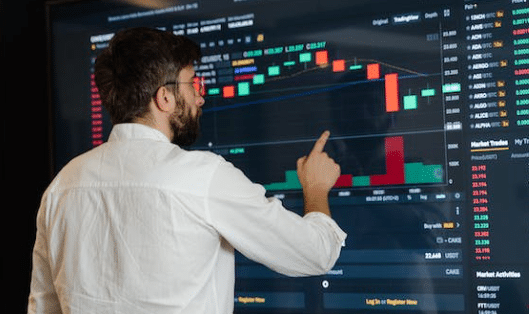In this article, we’ll delve into 18 key ideas from “The Disciplined Trader” by Mark Douglas exploring their implications for traders and the finance world.
Investing in the stock market is often seen as a game of numbers and financial acumen. However, in his seminal work, “The Disciplined Trader”, Mark Douglas makes a compelling case that the key to success in trading lies not in the analysis of market trends and financial data alone, but also within the psychological makeup of the trader. The nuances of financial markets, the ebbs and flows of stock prices, and the resulting changes in a trader’s portfolio all play a massive role in shaping the psychological landscape of a trader.
Douglas’s book presents a path to financial success that goes beyond traditional trading strategies and market analysis. It offers an introspective journey that challenges traders to assess their psychological preparedness for the unpredictable and often emotional world of trading. It demands from its readers a deep introspection into their fears, anxieties, and risk tolerance, arguing that these psychological factors can make or break a trader’s ability to consistently profit in the stock market.
This understanding of the psychological aspect of trading, in combination with sound financial knowledge and strategies, has the potential to create a new breed of traders. These traders can remain balanced in the face of market volatility, make decisions devoid of emotional biases, and consequently, establish a successful trading career. The focus here is not just on earning profits, but on doing so consistently, which requires a level of discipline and emotional resilience.
Douglas’s premise, while intriguing, is far from straightforward. Trading, like any other profession, requires a mix of knowledge, skills, and the right mindset. “The Disciplined Trader” sheds light on these components, especially the often-overlooked psychological aspect, making it an invaluable resource for both novices and seasoned traders alike.
Now, we’ll delve into 18 key ideas from “The Disciplined Trader,” exploring their implications for traders and the finance world. Each point will be elaborated with relevant examples, helping you understand how these concepts apply to real-world trading scenarios.
18 Key Ideas from The Disciplined Trader
- Trading Psychology: Douglas emphasizes the importance of the trader’s mindset. Emotional reactions to gains, losses, and market volatility can cloud judgement and hinder decision-making. Understanding one’s emotional responses and building emotional resilience is crucial. A trader who panics and sells during a market dip may miss out on potential gains when the market recovers.
- Discipline and Consistency: Douglas suggests that disciplined trading leads to consistent profits. This involves sticking to a well-thought-out trading strategy, even when market fluctuations cause fear or greed. For example, traders who bought Bitcoin and held onto it during its volatile phases have seen substantial returns.
- Risk Management: Understanding and managing risk is a key aspect of disciplined trading. This involves setting stop losses to mitigate potential damage. For instance, if a trader buys a stock at $100 and sets a stop loss at $90, they limit their potential loss.
- Trading Plans: Having a detailed trading plan helps maintain discipline. This includes defining entry and exit points, risk-reward ratio, and money management rules. For example, a plan might state, “Buy XYZ stock if it drops to $50 and sell if it reaches $60 or drops to $45.”
- Detachment from Outcomes: Douglas argues for detachment from individual trade outcomes. Success or failure of one trade shouldn’t affect the approach to the next one. A trader who made substantial gains in a previous trade might risk more in the next, leading to potential losses.
- Belief Systems: Traders’ beliefs about markets can shape their trading behaviors. Believing that “markets are always rigged” might prevent a trader from capitalizing on genuine opportunities
- Personal Responsibility: The book urges traders to take personal responsibility for their trading results. Blaming the markets, bad luck, or external factors is counterproductive. A trader who accepts responsibility will learn from their mistakes and make more informed decisions in the future.
- Overcoming Fear and Greed: Douglas argues that fear and greed are the two most damaging emotions in trading. Overcoming these can lead to better decision-making. Traders must learn to fear the loss of capital and be greedy for consistent profits.
- The Importance of Self-Trust: Trusting one’s own judgement and trading plan is crucial. A trader who second-guesses their decisions may end up making impulsive changes that can lead to losses.
- Market’s Random Nature: Douglas emphasizes that markets are random and can’t be predicted with absolute certainty. Traders should focus on what they can control, like their reactions and risk management, rather than trying to predict market movements.
- Embracing Uncertainty: Embracing the uncertainty of markets can lead to psychological equilibrium. Traders who understand that anything can happen in the markets are better prepared to handle unexpected events.
- Objective Mindset: Developing an objective mindset helps traders make unbiased decisions. This involves analyzing market trends and data without letting personal beliefs or emotions interfere.
- Continuous Learning: The book stresses the importance of continuous learning and adapting to ever-changing market conditions. This ensures that traders’ strategies remain effective over time.
- Perception of Risk: How a trader perceives risk can greatly influence their trading behavior. Traders who view risk negatively may avoid good opportunities, while those who view it positively might take unnecessary risks.
- Psychological Analysis: Douglas advocates for regular psychological analysis to understand one’s trading behavior. This can help traders identify psychological barriers and work towards overcoming them.
- The Illusion of Control: The book warns against the illusion of control, a common psychological trap where traders believe they can control market outcomes. Understanding that control lies within oneself, not the markets, can lead to better decision-making.
- Emotional Equilibrium: Maintaining emotional equilibrium is key to successful trading. This involves managing one’s emotional reactions to market movements and trading outcomes, ensuring they don’t disrupt the trading plan.
- Using Pivots and CPR: Pivots and Central Pivot Range (CPR) are technical tools that help traders make objective decisions. They provide potential entry and exit points, reducing reliance on emotional decision-making.
“The Disciplined Trader” opens up a new dimension for traders, one that underscores the importance of psychology in trading. It offers an enlightening blend of financial acumen and emotional intelligence, presenting a holistic approach to trading that can lead to consistent success. Through the 18 key ideas explored above, we delve into the essence of Douglas’s teachings, drawing invaluable lessons applicable to any trader.
These lessons extend beyond the world of trading and finance. They reflect fundamental aspects of human psychology, teaching us how our beliefs, emotions, and behaviors can shape our experiences and outcomes. Douglas’s work encourages introspection and self-improvement, invaluable life skills regardless of one’s profession.
In essence, “The Disciplined Trader” presents a comprehensive roadmap for achieving consistency in the unpredictable world of financial markets. It offers insights into disciplined trading, psychological resilience, and the role of continuous learning in achieving success. It challenges us to look beyond conventional wisdom and to understand that successful trading is not just about market knowledge, but also about mastering one’s mind.
Did you know? Traders like to use our coworking space in Bangalore
Learn more about our coworking space on our YouTube channel Work Theater Studios where we talk about a variety of topics including personal finance, entrepreneurship, business and life.
Did you know? We also have a private theatre in Bangalore.




